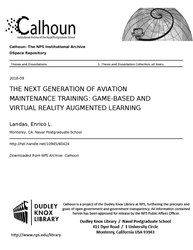File:THE NEXT GENERATION OF AVIATION MAINTENANCE TRAINING- GAME-BASED AND VIRTUAL REALITY AUGMENTED LEARNING (IA thenextgeneratio1094560424).pdf

Original file (1,275 × 1,650 pixels, file size: 4.04 MB, MIME type: application/pdf, 108 pages)
Captions
Captions
Summary[edit]
| THE NEXT GENERATION OF AVIATION MAINTENANCE TRAINING: GAME-BASED AND VIRTUAL REALITY AUGMENTED LEARNING
( |
||
|---|---|---|
| Author |
Landas, Enrico L. |
|
| Title |
THE NEXT GENERATION OF AVIATION MAINTENANCE TRAINING: GAME-BASED AND VIRTUAL REALITY AUGMENTED LEARNING |
|
| Publisher |
Monterey, CA; Naval Postgraduate School |
|
| Description |
Plane captains are an essential part of efficient flight line operations. They coordinate multiple efforts during aircraft ground operations. The current training methods for plane captains have several significant issues. We built a simple immersive part-task trainer for plane captains using commercial gaming technology. The system consists of two distinct domains: one in which trainees control a virtual aircraft using their body motion and another that provides 360-degree video of common operations. We also conducted an experiment to determine whether such a system improved the performance of plane captains over traditional training methods. In our experiment, we trained two groups of plane captains: one via traditional methods and the other via the new system. The subjects then performed different signals while a group of subject-matter experts rated them. Although traditionally trained subjects performed better, comments by the graders indicated that the causes of the differences could be fixed in a production version. Additional analysis suggests that those trained with the system are just as confident in their abilities as those trained traditionally. We also conducted a survey of qualified plane captains who had used the system and the results were overwhelmingly positive. Subjects: MOVES; modeling; virtual environments; simulation; training; education; 360 video; Kinect; gesture recognition; aviation training; plane captain; gamification; self-regulated learning; F-35; JSF |
|
| Language | English | |
| Publication date | September 2018 | |
| Current location |
IA Collections: navalpostgraduateschoollibrary; fedlink |
|
| Accession number |
thenextgeneratio1094560424 |
|
| Source | ||
| Permission (Reusing this file) |
This publication is a work of the U.S. Government as defined in Title 17, United States Code, Section 101. Copyright protection is not available for this work in the United States. | |
Licensing[edit]
| Public domainPublic domainfalsefalse |
This work is in the public domain in the United States because it is a work prepared by an officer or employee of the United States Government as part of that person’s official duties under the terms of Title 17, Chapter 1, Section 105 of the US Code.
Note: This only applies to original works of the Federal Government and not to the work of any individual U.S. state, territory, commonwealth, county, municipality, or any other subdivision. This template also does not apply to postage stamp designs published by the United States Postal Service since 1978. (See § 313.6(C)(1) of Compendium of U.S. Copyright Office Practices). It also does not apply to certain US coins; see The US Mint Terms of Use.
|
 | |
| This file has been identified as being free of known restrictions under copyright law, including all related and neighboring rights. | ||
https://creativecommons.org/publicdomain/mark/1.0/PDMCreative Commons Public Domain Mark 1.0falsefalse
File history
Click on a date/time to view the file as it appeared at that time.
| Date/Time | Thumbnail | Dimensions | User | Comment | |
|---|---|---|---|---|---|
| current | 08:22, 25 July 2020 |  | 1,275 × 1,650, 108 pages (4.04 MB) | Fæ (talk | contribs) | FEDLINK - United States Federal Collection thenextgeneratio1094560424 (User talk:Fæ/IA books#Fork8) (batch 1993-2020 #30001) |
You cannot overwrite this file.
File usage on Commons
The following page uses this file:
Metadata
This file contains additional information such as Exif metadata which may have been added by the digital camera, scanner, or software program used to create or digitize it. If the file has been modified from its original state, some details such as the timestamp may not fully reflect those of the original file. The timestamp is only as accurate as the clock in the camera, and it may be completely wrong.
| Short title | THE NEXT GENERATION OF AVIATION MAINTENANCE TRAINING: GAME-BASED AND VIRTUAL REALITY AUGMENTED LEARNING |
|---|---|
| Image title | |
| Author | Landas, Enrico L. |
| Software used | Landas, Enrico L. |
| Conversion program | Adobe PDF Library 11.0 |
| Encrypted | no |
| Page size | 612 x 792 pts (letter) |
| Version of PDF format | 1.4 |

